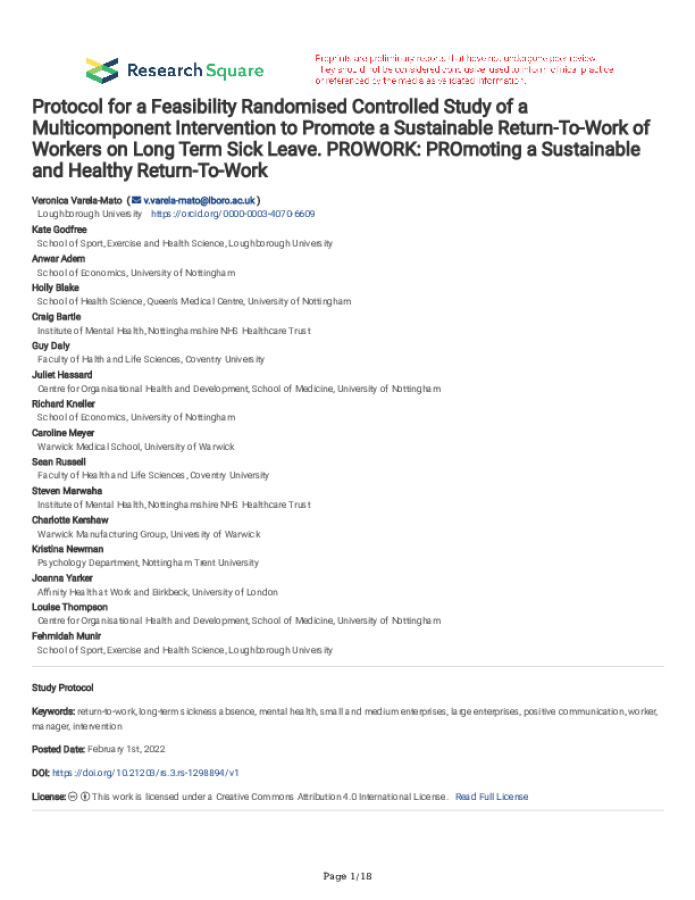Protocol For A Feasibility Randomised Controlled Study Of A Multicomponent Intervention To Promote A Sustainable Return-To-Work Of Workers On Long Term Sick Leave
The cost of sickness absence has major social, psychological, and financial implications for individuals and organisations. Return-to-work (RTW) interventions that support good quality communication and contact with the workplace can reduce the length of sickness absence by between 15 to 30 days. However, initiatives promoting a sustainable return-to-work for workers with poor mental health on long-term sickness absence across small, medium and large enterprises (SMEs and LEs) are limited. This paper describes the protocol of a pilot randomised controlled trial (RCT) to test the feasibility of implementing a RTW intervention across SMEs and LEs across all sectors.
This is a novel intervention using a worker-manager approach to promote a sustainable return-to-work of workers on long-term sick leave due to poor mental wellbeing. If this intervention is shown to be feasible, the outcomes will inform a larger scale randomised control trial.
Protocol For A Feasibility Randomised Controlled Study Of A Multicomponent Intervention To Promote A Sustainable Return-To-Work Of Workers On Long Term Sick Leave
- Date Published
- Sat, 1st Jan 2022
- Publisher
- Pilot and Feasibility Studies
- Reference
- Godfree, K., Adem, A., Blake, H., Bartle, C., Daly, G., Hassard, J., ... & Munir, F. (2022). Protocol for a Feasibility Randomised Controlled Study of a Multicomponent Intervention to Promote a Sustainable Return-To-Work of Workers on Long Term Sick Leave
- Website
- https://doi.org/10.21203/rs.3.rs-1298894/v1
- Categories
- Keywords
- Absence, Return to Work, Intervention
The cost of sickness absence has major social, psychological, and financial implications for individuals and organisations. Return-to-work (RTW) interventions that support good quality communication and contact with the workplace can reduce the length of sickness absence by between 15 to 30 days. However, initiatives promoting a sustainable return-to-work for workers with poor mental health on long-term sickness absence across small, medium and large enterprises (SMEs and LEs) are limited. This paper describes the protocol of a pilot randomised controlled trial (RCT) to test the feasibility of implementing a RTW intervention across SMEs and LEs across all sectors.
This is a novel intervention using a worker-manager approach to promote a sustainable return-to-work of workers on long-term sick leave due to poor mental wellbeing. If this intervention is shown to be feasible, the outcomes will inform a larger scale randomised control trial.
- Protocol For A Feasibility Randomised Controlled Study Of A Multicomponent Intervention To Promote A Sustainable Return-To-Work Of Workers On Long Term Sick Leave (PDF, 991 Kb)
Did you find this report useful? Yes / No 8 people found this useful.


